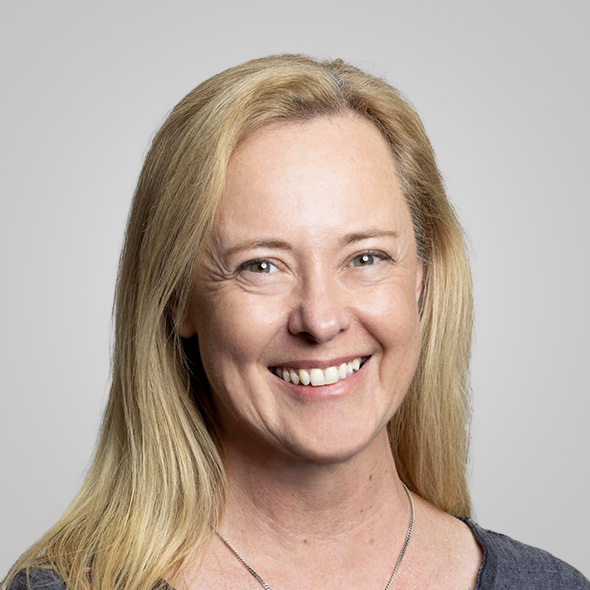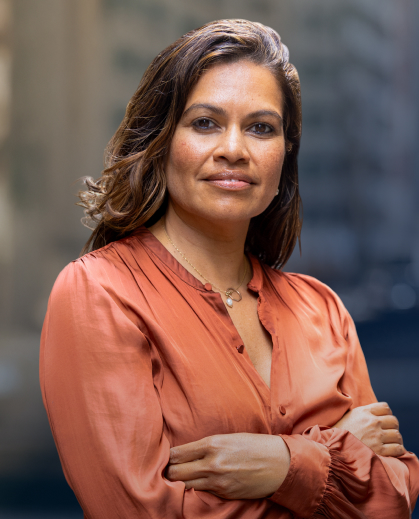For 50 years, the AICD Company Directors Course has provided world-class governance education to more than 100,000 participants. Facilitators play a vital role in the face-to-face education of those undertaking the course. Three share their stories.
Sharon Winks GAICD
Sharon has been a CDC facilitator for three years and has presented webinars and events for the AICD since 2019.
“Anyone who walks into this director journey needs to understand we’re not going to be experts at everything... If you can go in with that mindset, then you’ll be a good director.”
What role do you play as a facilitator?
The complexity of decision-making at the director level is not black and white. There’s a lot of nuance. The facilitators provide an opportunity to share their real-life experiences and draw out that peer-to-peer learning in the room. In the case studies we do, the facilitator isn’t looking for a right answer. The facilitator is looking for people to think and apply a director mindset. It allows people to explore all the different facets of thinking they need and put it together into a solution they can stand by. That demonstrates how a board works. That’s where the facilitation uplifts people’s thinking around being a director — how complex it is and how much attention and focus you need.
How has the CDC evolved?
The AICD has done a good job evolving the service offering. People can do it online — or one day a week spread over a period of time. They can do five days straight. Also, there is a greater focus on what a director mindset looks like. There’s attention to the language and terminology of how you act as a director and that you need to develop a fit-for-purpose governance model for your organisation.
There’s a greater focus on stakeholders — understanding it’s not just members and shareholders who drive our businesses, but ethical decision-making and a social licence to operate. There’s a maturity to our materials — the resources have evolved to address a broader range of issues and stakeholders. It actually reflects what’s happening for directors.
The CDC provides two-way learning. The participants raise questions their boards are facing. They talk about those challenges. This tells me what’s changing for boards and what we need to be focused on. After every course, I’ll reflect on the questions, issues and discussions that have come up. Then I’ll think about how to make sure we’re covering those the next time. It’s a continual iterative process.
How do you stay up to date with governance changes?
I do an enormous amount of professional reading and attend webinars and events hosted by the AICD and other professional organisations. I talk and listen to peers. What challenges are they facing? What sort of opportunities do they see? I look at the work of the regulators. They are talking to us all the time about what’s really important in a governance space. The facilitators also talk and learn from each other. At the end of the day, it’s about ensuring the CDC remains the ultimate learning program. Everyone is so focused on that as a purpose. It’s rewarding to be a part of.
What networking benefits have you seen emerge among participants?
The way we do the CDC encourages people to network — to be part of the tribe you studied, learned and shared with. On a board, directors face many difficult discussions and decisions. Knowing when to ask for help is important, but takes courage. At the end of the day, directors want to do the right thing for the organisation. Asking for help is not a sign of weakness, it’s a sign of strength. The course helps people to ask the right questions, to actually make that decision and work as a collective, because that’s what a board does. Participants lean on their CDC peers to do this.
What do you hope directors take back to their boardrooms?
Anyone who walks into this director journey needs to understand we’re not going to be experts at everything. We’re never going to have all the answers. If you can go in with that mindset, then you’ll be a good director, because you’ll constantly seek to learn. You’ll constantly seek to hear what others say and think. Ask those hard questions and know when you need help.
Tony Clark GAICD
Tony has been a CDC facilitator for 12 months. Having completed the course, he was approached to join as an educator.
What role do you play as a facilitator?
We make governance human rather than theoretical. As a facilitator, you make it real, because governance is different in every single setting. Across industries, sectors and organisations, there’s so much about understanding how to apply, what to apply, when to apply.
How do you see governance evolving?
Governance needs to evolve towards recognising the value of lived experience. It’s too focused on technical expertise. As someone who’s blind, I feel there is an emerging understanding that the human [element] is an important part of governance. Not to diminish technical expertise, but ultimately success is driven by culture and people. It is their experience that is important. We need to expand to include the value of that lived experience, but also the value and impact of stakeholder management. It’s something I’m looking forward to evolving over time.
How do you stay up to date with governance changes?
The AICD has great resources and events, but more practically, I find the best place is industry networks, which contextualise it for your sector, so you can understand what issues need to be addressed and how it applies.
What networking benefits have you seen emerge among participants?
I see it progress through the language and questions during my time with a group. They move from thinking about the individual and operational to a more collegial, strategic mindset. They can see the value in that. You can’t guarantee it, but I feel it sows the seed for how it might translate back into their own boards and organisations. Along their journey, I hope they will try to replicate that collegiality.
What do you hope directors take back to their boardrooms?
My key success outcome is to give our participants confidence, so when they’re in a boardroom, they feel confident to ask the “dumb” question. Governance is about simplifying complexity. It’s collective, not individual anymore. Directors should feel confident to simplify — to see how an issue relates back to the purpose and how it benefits their organisation. Most importantly, how does it drive our culture where we need to go?
Dr John Sing MAICD
John has been a CDC facilitator for more than 10 years, usually addressing the financial module, one of five modules covered by the course.
What role do you play as a facilitator?
Directors and prospective directors have responsibilities around financial reports. Some participants might previously have been a CFO, but many won’t have a finance background. We demystify the financials. The whole course is designed to enhance confidence levels, so that directors can contribute to discussions around the boardroom table and feel more comfortable in meeting their financial reporting obligations.
Some directors are quite anxious about the numbers. By the time they get through the material and discussions, they should be feeling a lot more confident. We aim to strip away the jargon and provide a few more tools to apply. We talk about the warning signs for insolvency. We run through really practical tests. The aim is to help the board members understand why they should be asking particular types of questions before signing off on their numbers. In a face-to-face, I can keep an eye on all the attendees. You get a feeling if someone is starting to fall off the back of the finance bus and you can do something to assist them.
How has the CDC evolved?
A while back, it wasn’t uncommon for boards to rely on one or two members to carry the entire burden of reviewing and understanding the numbers. That doesn’t wash anymore. The requirement is that all directors need a degree of financial literacy.
There are now more tools in place to help them. After completing the course, directors are better placed to analyse and interpret their numbers, identify issues of concern and make informed decisions.
How do you stay up to date with governance changes?
The AICD has great resources, but also via peer networking directly in the various sectors. As facilitators, it’s incumbent upon us to ensure we remain across what is changing and what that might mean for directors. That’s all part of taking that lifelong learning approach.
What networking benefits have you seen emerge among participants?
The CDC and governance for NFP directors’ courses are done in a very fit-for-purpose way. Participants learn what they need to be doing to support their organisations from a governance perspective. I know participants who have met in the course and now get together periodically to share their knowledge, experience and the templates they’ve developed. A lot of NFPs don’t have the full resource support, so they are building a community of governance, which has been wonderful to see.
What do you hope directors take back to their boardrooms?
Directors face strategic challenges when things are volatile and uncertain, as well as complexity and ambiguity. The courses are designed to emphasise key fundamentals of good governance in these uncertain times. Take the rapid pace of AI, for example. The value is not necessarily in the answers. The value is in the questions directors actually pose. It’s so important for directors to have the level of confidence to ask the right questions and maintain an inquiring mind.
This article first appeared under the headline 'Leading the leaders’ in the September 2025 issue of Company Director magazine.
Latest news
Already a member?
Login to view this content



.jpg)
